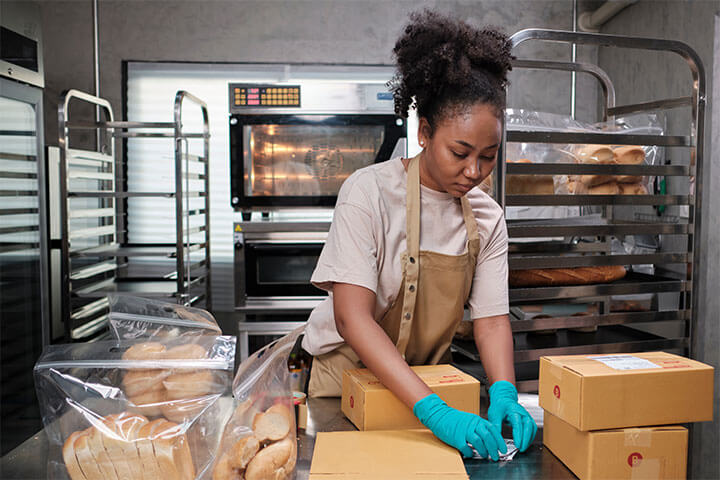The 21st century has ushered a rise in niche food, diverse cuisines, and on-demand services. As the demand for affordable and accessible professional kitchens grew, so did a new reliance on commissary kitchens. In this article, we explain the role commissary kitchens play in modern American food culture, including the advantages, disadvantages, and the types of foodservice businesses they benefit the most.
What Is a Commissary Kitchen?

Essentially, a commissary kitchen is a shared, professional-grade kitchen that foodservice businesses rent on an hourly, daily, or monthly basis. They meet all the health and safety regulations required of a commercial kitchen and are outfitted with professional-grade equipment such as industrial ovens, walk-in refrigerators, and food processors. Depending on the location, commissary kitchens may also offer amenities such as loading docks, marketing support, and laundry services.
Who Operates in a Commissary Kitchen?

Commissary kitchens help a variety of foodservice entrepreneurs succeed in our competitive sector including:
- Food Trucks: Operators use the commissary to prepare their food and store their equipment. For instance, Lisa Gutierrez began her Dos Hermanos success by operating out of a commissary kitchen.
- Caterers: If caterers do not have a dedicated workspace of their own, renting commissary kitchens saves the day. They are especially convenient for caterers who serve a wide geographical area because they can rent kitchens based on event locations. Commissaries also help caterers grow their business, if they are experiencing a surge in bookings or if their current location is too small to accommodate the amount of food preparation necessary for an event.
- Ghost Kitchens: Because they don’t operate using a physical storefront and rely on delivery services, renting a space provides ghost kitchens with a legal and regulated area to set up shop and prepare their food.
- Small-Batch Producers: Ambitious artisanal chefs rent commissary kitchens to prepare their specialties that they then sell in farmers markets, specialty markets, or online.
- Prospective & Current Restaurant Owners: Commissary kitchens are an ideal place to develop a menu and experiment with recipes. Some commissaries offer meeting or event spaces where entrepreneurs host tastings.
Advantages & Challenges of Operating in Commissary Kitchens

While commissary kitchens offer a breadth of foodservice businesses an opportunity to get started, grow their operations, and experiment with new ideas, there are payoffs and tradeoffs.
The Advantages of Commissary Kitchens
As seen in the numerous types of foodservices businesses that use commissary kitchens, there are undeniable advantages. The most obvious and meaningful advantage is reduced overhead costs. Operating a restaurant, leasing a space, and investing in commercial equipment is a huge monetary investment that the average person either cannot swing on a dime or may find too risky when their business is in the experimental stage.
Commissary kitchens also offer the flexibility to scale production up or down as needed. Additionally, they take away much of the red tape and headaches restaurant owners face such as permits, architectural issues, HVAC systems, grease disposal, parking spaces, and safety regulations, to name a few. Renting a space allows operators to focus solely on their product and their customers.
Lastly, they offer food entrepreneurs a chance to connect with likeminded individuals. Often, they share ideas, offer advice, and support each other, creating a community and network that is highly advantageous for a new business.
Potential Challenges When Operating Out of Commissary Kitchens
While commissary kitchens are wonderful, it pays to be aware of challenges you may face. One potential challenge rests upon sharing a space with others. Depending on the kitchen, there may be booking competition, and the potential to lose access to your preferred time slots and equipment.
Another challenge is there’s a potential for logistical issues. Since these are shared resources, there may be equipment breakdowns, shortages, delays in cleaning or waste removal, and other potential factors that could disrupt your ideal workflow.
Ultimately, the success of a commissary kitchen depends on careful planning, clear communication, and responsible behavior from the owners and users. When hunting for a space, we recommend addressing any concerns with the kitchen owner, so you can prepare for any challenges that may arise.
Flexible Food Prep

Commissary kitchens are hubs of culinary innovation, supporting both emerging and established foodservice businesses. These shared professional-grade kitchens offer a cost-effective solution for businesses, allowing them to navigate the competitive sector with reduced overhead costs and operational flexibility. What has your experience with commissary kitchens been? Let us know in the comment section!



